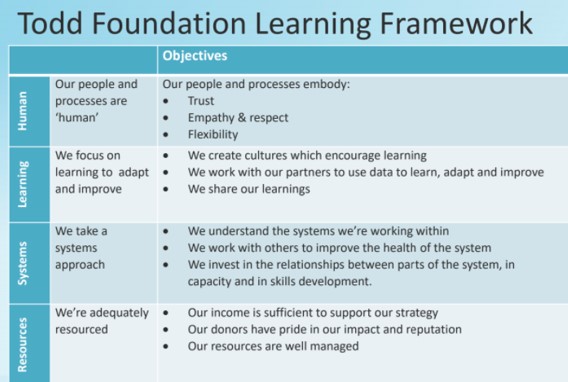




Being Human, Systems-focused, and Learning.
Our journey to better outcomes for children, whānau and communities. By Susie Schwartz, Programme and Relationship Lead, Todd Foundation.
There are no quick fixes to complex issues such as reducing inequality or responding to the long-term social and economic effects of Covid-19; areas where the Todd Foundation aims to make an impact.
How do we embrace complexity, learn from it, and continually improve the way we serve the leaders in our communities who are driving change? How can we best work collaboratively to catalyse and support longer-term social change in Aotearoa?
These are questions Todd Foundation staff and trustees continue to reflect on, alongside our community partners and other funders. To help with the answers, last year we began formally capturing what we are learning as a foundation and using it to improve the way we work.
To guide our reflections and discussions, we’ve developed a learning framework, using insights from researchers at Newcastle University Business School and Collaborate in their 2019 report, Exploring the new world: Practical insights for funding, commissioning, and managing in complexity.
In this report, Toby Lowe and Dawn Plimmer identified three common features of funding and commissioning work that embraces the complexity of social change: Working in a way that is human, prioritises learning, and takes a systems approach.
Each month, our Todd Foundation team asks: To what extent are we being human, using learning to improve, and looking after the health of systems? And what are we learning about how to do this well? We’ve also added another question specific to our foundation: Do we have adequate resource to do these things well? And at each Foundation Board meeting, our trustees contribute their reflections.

Todd Foundation Learning Framework.
Being human
Over many years we’ve learned that; when our relationships are trusting and honest; when our processes are simple; and when we can provide multi-year, flexible funding, the groups that we fund can focus their energy on achieving their vision rather than filling out application forms, writing accountability reports, or competing with others for our funding. We trust the groups we fund to know how best to use our funding and to adapt their activities as their needs change. A key challenge for Todd Foundation staff has been having the capacity to dedicate enough time to build and maintain quality high-trust relationships. We are working on how to resolve this.
Learning
Peoples’ lives are complex and the issues that we’re concerned with, such as homelessness, food insecurity, health, and systemic racism are interconnected. We cannot expect individual programmes or interventions to be the ‘silver bullets’ that will fix these issues. Delivering better outcomes for people takes whole networks of people and organisations.
As a result, we have taken the pressure off individual organisations to prove their impact. Rather, we believe that creating cultures which encourage reflection and learning will drive adaption and result in better outcomes.
To reflect on our own funding practice, we hold regular learning sessions with colleagues at Inspiring Communities and upskill ourselves alongside other funders such as J R McKenzie’s Peter McKenzie Project and the Vodafone New Zealand Foundation. We also learn about how to contribute more effectively to social change while participating in communities of practice and the networks we support, such as The Driving Change Network. Having open and honest conversations about our challenges and what we are learning, helps us to do better together.
In 2020, starting in lockdown, we invited our community partners to join us for fortnightly Zoom hui to share what we were learning and noticing about food insecurity and how that was playing out during the Covid-19 pandemic. We learned the critical role that relationships played in getting food to where it was needed, tailored specifically to different family needs and circumstances. The group shared a common desire to move beyond a crisis response, ensuring that we paid attention to supporting whānau to access healthy, nutritious food in the long-term: To have access to land, to have enough income, to grow their own food and enterprises, and to build resilient local food systems. We continue to learn and work together.
We have identified the need to share what we and our community partners are learning more widely and more often, to shine a light on what is working and to be upfront about the challenges involved in transforming our systems and communities for the better.
Systems
At the Todd Foundation, we’ve been reflecting on our role in supporting longer-term social change. Where we’ve landed is that our role is to work alongside others to set the conditions for healthier social systems so that they produce better outcomes for tamariki, rangatahi, whānau and communities. Systems we’re currently trying to influence include housing; digital equity; youth employment; food security; diversity, racism and inclusion. Rather than fund individual programmes, the foundation invests in networks that bring change-makers together, support the capacity and skills of people who work in these systems, and invest in Māori and community-led solutions for change. We aim to be effective influencers, convenors and advocates.
We’ve found that investing in relationships within social systems helps build momentum and sustains our collective work over time. We have also found that it’s critical to keep learning about the complexities of each system, and to use this information to make better collaborative decisions.
In 2020, we found that taking a human, learning and systems approach was invaluable, not just in responding flexibly to the immediate challenges of a global pandemic, but also as we invest in longer term change through our Fairer Futures systems change project and other collaborative work.
We’d like to thank all our community partners and philanthropy colleagues for the learning journey we are taking together.
Ngā mihi ki a koutou.
